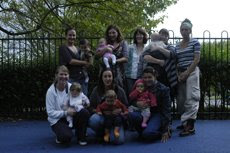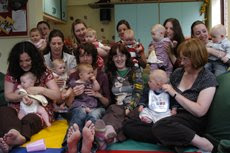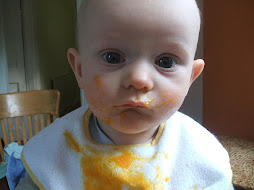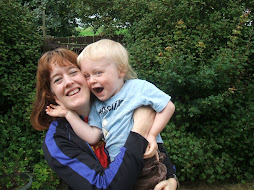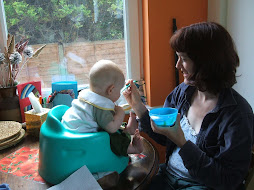This article was written in 2008
---------------------------------------------------------------------------
I look at my second son sleeping peacefully and experience a great sense of calm. I don’t feel lonely, panicky, isolated – all the sensations that were so strong after my first child was born. I don’t feel I’m pretending to be a mother. I just am a mother.
My desire for a second child was incredibly strong, probably exacerbated by being an only child and the overwhelming sense when I was growing up that something was missing. In fact the emotions that engulfed me when I became a mother were like re-opened wounds from my childhood. I was fearful that I would feel distanced from my second baby, mired in anxiety and uncertain at every turn. I remember the sensation of being marooned in a big tunnel straight after Robin’s birth, cocooned from reality by the effects of the epidural. I looked dispassionately at my partner and cousin as they exclaimed in emotional delight over the newcomer. I wanted to get cleaned up, to eat, to sleep. The midwife said, ‘’let’s get Mum up to the ward’ and I thought, ‘my Mum’s not here, is she?’ I couldn’t get my head round the fact that I was ‘Mum’. In the fog of the first few weeks, I kept thinking how hard everything was – I was conscious of being at odds with myself, although I’d give the impression that everything was fine. How on earth would I ever be able to manage two when I couldn’t manage one? And yet, I desperately didn’t want Robin to be an ‘only’.
The birth was so quick second time that I had no time for drugs. This meant I had a triumphant rush of ‘super-beingness’ straight after that had been described to me by the only two mothers I knew who’d had drug-free births. I felt alive, vital, strong. After the event, I was too excited to sleep. I just kept looking at Luke with a rush of pure love. Now the rest of our lives could begin. The wounds of the first time seemed to have healed themselves.
It took a long time to convince my partner to have a second – he has a difficult relationship with his sister and felt trepidation at the notion that siblings could support each other. I’d focused on my feelings for my newborn so much, I hadn’t really considered how the relationship I’d have with Robin would change. We’d all talked about how to prepare Robin to cope with his new brother, but hadn’t considered how we adults would react to the different dynamic. It’s not a subject I’ve discussed with my partner or close family, although I sense their attitude towards Robin is unchanged. To my partner, Luke is less absorbing while he is in the baby stage. His primary focus is still Robin who can express his needs in words rather than wails. This was brought home to me recently when I went out one evening and stayed out a bit longer than I’d expected. I had a panicky phone call from him saying Luke was crying and he didn’t know what to do. I’ve rarely had this experience with Luke, unless he is unwell. I’m always able to calm him, usually through breast-feeding, which is clearly an unfair advantage, but it brought home to me how much I’d learnt through Robin. You just do this! Or that! It’s obvious. And yet it wasn’t to him, even though we’d been through it once before.
With my first child I was eager for the markers of development that proved he was ‘normal’ – first smile, sitting, crawling, feeding himself and so on. Feeling like a dinghy on a stormy sea, I looked for the anchors of these progressions to prove that I was doing it right, that I didn’t appear to be a fraudulent mother. Was it obvious that I was finding it so difficult? That I watched other mothers who seemed so natural and close with their babies while I was so unsure? Perhaps I was longing to get onto the part that was easier, that made sense, where my baby and I could connect. Eventually the connections did come, as I expect they do for most new mothers and I couldn’t imagine my life without him, although it was a gradual stealing up on me, rather than a blinding flash. The memory of this uncertainty was brought home to me recently, when I observed a first-time mother at a group. Her actions and responses towards her baby looked very studied and deliberate, as if she was mimicking what she’d seen other mothers do rather than responding spontaneously to her baby. I wondered if that was how I’d come across to others with Robin.
With Luke, I was reluctant to see the signs that took him away him babyhood. Stronger than that – a sentimental part of me wishes he could stay a baby forever. The day I accepted he was too big for his Moses basket and would be better off in a cot, I was maudlin all afternoon. I had him packed off to college already in my mind. Perhaps he sensed this himself and woke more often in the night for the subsequent weeks, meaning I’d usually end up tucking him in next to me in order to gain precious sleep before Robin woke. To hell with the expert books that I’d been so hidebound by the first time that implied if you let the baby sleep with you, he’d never sleep alone, that is if he’d survived being squashed by you in the first place. He’d snuggle down next to me, with a look of pure contentment on his face. It seemed so natural, so right.
Breastfeeding the second time was so much easier and I had a real sense of achievement that I managed to get to six months on my milk alone. Luke truly was what I made him. It was quite often hard to keep doing it, especially in the evenings when Robin was tired after nursery and clamouring for my attention. Quite often I’d be suffused by irritation at Robin’s three year old whines robbing me of the special alone time with the baby. This would intensify if Robin stuck his head between mine and Luke’s, blocking my view of him. I’d snap at Robin, then immediately feel guilty. How could I get cross at my young child, who had had all of my attention until now and quite reasonably couldn’t understand why this new impostor had muscled in. And yet, was I being too hard on myself? If anybody else had stuck their head in, I would have been quite justified in my snapping. Even your nearest and dearest have to accept the boundaries of personal space. But for the first months you have to hold your baby close because they can’t manage on their own. Their personal space is the same as yours because in some way they are still part of you. After that begins the gradual, and sometimes painful, sequence of letting go at various significant points of nursery or school.
The guilt still chimes in the head. I forgive Robin when he butts in, only to feel irritated all over again the next time he does it. I worry that I am a bad mother, favouring one child over the other and wonder if I am unable to share my love equally because as an only child, I didn’t experience the division of attention between me and a sibling. The assumption is often made that only children are spoilt, getting whatever they want, but the battle to get attention can often be greater, because you have to enter a different arena. An ‘only’ has to move in the realm of the adults, talk their language, adopt their customs, rather than the more understandable world of another child.
I fast forward myself fifteen or so years and hear the accusing voices of my children saying ; ‘You always loved X better’. Is this how it starts? The little chippings away at your good humour? Your lack of patience because you are so, so tired after the baby’s restless night of teething, then rudely awakened in the early morning by your older child who’s had several hours of uninterrupted sleep. And yet again, how lucky you are to have two beautiful, healthy, wonderful children – how dare you complain, even for a second, because at any moment it might all be taken from you? So my mind goes on, like a mouse on its wheel, turning these thoughts over.
Robin asked me recently who was my favourite between him and Luke. Favourites are a current obsession with him, so this was an off the cuff question, no more significant than weighing up that he preferred blue to red. Like the correct response to ‘Does my bum look big in this?’, the instant answer was that I loved them both equally. I then thought a bit more and said that it might seem that Luke was my favourite because he needed more looking after at the moment. Even though that is definitely the truth, I wonder if it’s the whole truth. A mother I spoke to recently said she was very keen to bring up her child differently to her own upbringing, wanting a closer bond than she had had with her own parents. She would have no idea whether this was successful until several years had passed and her child could choose how much time he wanted to spend with her.
The relationship I have with my sons is in a equal state of flux. I do feel a closer bond at the moment with Luke, more synchronicity. How much this is due to being more relaxed, more settled in my role as a mother, it is impossible to say. When I look in his eyes, I experience a real connection to the person. He is not the complicated machine that has to be fed, changed and entertained correctly otherwise he will break down. That was how it had sometimes felt with Robin. A mantra kept running through my head back then…. ‘Is he too hot, too cold, hungry, thirsty, tired, bored….help!!’ I couldn’t see the person behind all the tasks that had to be done, and yet, I was learning ‘on the job’ and did the best I could at the time. It is so easy for a mother to feel guilty, that she is doing everything wrong. I, like countless others, reached for manuals to reassure me rather than trusting my instincts. With Luke I feel more confident, I can read his ‘signals’, although I was always baffled as to what this meant the first time round. It sometimes feels awkward if someone else is present and I have to articulate what I think Luke needs at a particular point. It’s like learning to drive a car, or play the piano or type – if you look to see what your hands are doing or attempt to explain it to a bystander, you have trouble continuing.
I try to hide from the inevitable that this darling baby will, all too soon, be a truculent toddler, answering back, refusing to eat his greens, causing scenes in the supermarket – all the things that had made you tut before you became a parent yourself and knew the relentlessness of daily life. As I write, Luke is less than a year and is adorable. By the time he is a ‘terrible two’ (and terrible three in my experience!), Robin will be five :- if the evidence of my friend’s children is anything to go by, he will be calmer because he is able to express himself more clearly. Does nature programme a mother to be wrapped up in her defenceless new baby, to the exclusion of her other child(ren), for its own safety? Maybe the mixture of feelings I have now are as normal and natural as the overwhelming ‘all at sea’ ness after the first birth. Undoubtedly some babies are easier than others regardless of their place in the pecking order of the family. Perhaps I have been lucky that Luke is so amenable.
When I was pregnant with Luke, I spent the afternoon with a family who had a two year old and a baby. I’d known them when the first child came along and observed their delight over her but not seen them recently and was surprised to see that they were very sharp with the older child over what seemed to be small matters. The baby had all of the attention and the child seemed to be sidelined. I thought I wouldn’t treat Robin like that, however irritating he was. I certainly wouldn’t humiliate him by drawing attention to his shortcomings in public. Like so many humbling experiences of becoming a mother I find myself behaving exactly like that, ticking Robin off with the same sharp tone of voice, regardless of who is around. I have to remind myself he is still very young and I am tired – the two together sometimes produce fireworks. I do love Robin passionately; the thought of any harm coming to him is unbearable. We always kiss and make up if either of us has been cross with the other and small children are superb at not bearing grudges, which has taught me to let go too.
Robin is very protective and proud of his little brother and Luke, in turn, lights up when he sees Robin. Occasionally Robin can be over-boisterous, usually when he is tired, but he delights in making Luke laugh. He accepts that he is not allowed to pick Luke up unless I’m there and his concern when the baby is crying is almost as great as mine. Unconsciously he adopts my language when calming him, ‘it’s alright, baby…..’ or he will scuttle to fetch a favourite toy or a dummy. Sometimes he will grab one of the baby toys, insisting that it is his, which is, I imagine, a call for attention. At the moment, Robin is unquestionably top dog in terms of skills and strength. I am slightly anxious about how he will respond when Luke is able to go for the toys himself and challenges the older’s authority. Hopefully the bond between them will be strong enough to overcome the spats.
Some of the sweetest moments are when I see Robin nestling up to Luke, whispering something to him or showing him a picture in a book. It is tinged with sadness, for there is a realisation that they will have a special bond as brothers that will exclude me in years to come. I’m thankful that they will have each other to confide in and fervently hope that their relationship develops with the passing years and doesn’t go sour. I am bursting with pride over my two boys; I will do my best to treat them both fairly and equally and have faith that life will do so too.







